
Charles Miller Croswell was the 17th governor of Michigan from 1877 to 1881.

The following is a list of National Register of Historic Places listings in Lenawee County, in the U.S. state of Michigan.
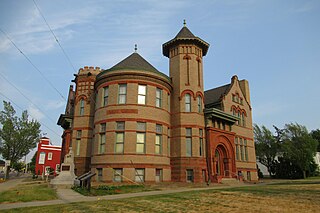
The Adrian Public Library is a historic structure located at 110 East Church Street in downtown Adrian, Michigan. Originally used as a library, it was designated as a Michigan Historic Site on December 14, 1976, and later listed on the National Register of Historic Places on December 6, 1977. It is located within the Downtown Adrian Commercial Historic District and adjacent to the Adrian Engine House No. 1. Today, the building houses the Lenawee County Historical Society Museum.

The Clark Memorial Hall, also known as the Adrian I.O.O.F. Hall, is a commercial building located at 120–124 South Winter Street (M-52) in the Downtown Adrian Commercial Historic District in Adrian, Michigan. It was designated as a Michigan Historic Site and individually listed on the National Register of Historic Places on January 14, 1985.

The Dennis–State Streets Historic District is a residential historic district located on the south side of the city of Adrian in Lenawee County, Michigan. It was listed as a Michigan Historic Site on July 26, 1974. The district was later added to the National Register of Historic Places on April 14, 1975. On July 26, 1979, the historic district expanded its boundaries. This expansion, albeit consisting of only one additional property, required a separate listing on the National Register of Historic Places.

The John W. Keeney and Erena Alexander Rogers Farm, commonly known simply as the Keeney Farm, is a historic district located at 5300 Monroe Street (M-50) in Franklin Township in north-central Lenawee County, Michigan. It was designated as a Michigan Historic Site and added to the National Register of Historic Places on September 24, 2001. The apple orchard has been continuously operating since 1875, and is one of the oldest such orchards in Lenawee County.

The G. P. Sparks House is a historic private residence located at 509 East Logan Street in the city of Tecumseh in northeast Lenawee County, Michigan.
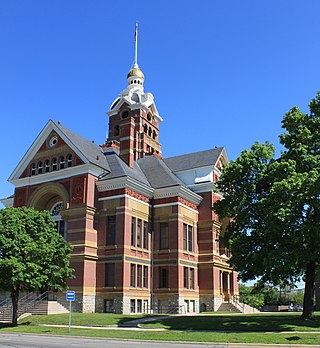
The Lenawee County Courthouse is a county courthouse located at 309 North Main Street (M-52) in the city of Adrian in central Lenawee County, Michigan. It was designated as a Michigan Historic Site on November 14, 1974, and later added to the National Register of Historic Places on February 28, 1991. The Lenawee County Courthouse is located at the corner of M-52 and West Front Street. West Front Street also carries the M-52 signage as it turns to form the northern edge of the U.S. Route 223 business loop around the Downtown Adrian Commercial Historic District.

The Hudson Downtown Historic District is a historic district comprising the downtown area of the city of Hudson in westernmost Lenawee County, Michigan. It was designated as a Michigan Historic Site on January 21, 1974. It was later added to the National Register of Historic Places on December 24, 1974.
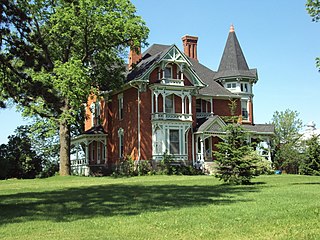
The George B. Horton and Amanda Bradish Farmstead is a privately owned farmhouse that sits on 40 acres of land at 4650 West Horton Road in rural Fairfield Township in Lenawee County, Michigan. It was added to the National Register of Historic Places on February 1, 2007. There are several other buildings on the property, but the main farmhouse was built in 1888 in Queen Anne Style.
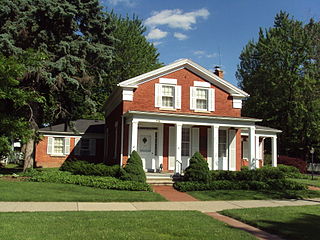
The Governor Charles Croswell House is a building located at 228 North Broad Street in the city of Adrian in Lenawee County, Michigan, United States. It was designated as a Michigan State Historic Site on February 19, 1958 and later listed on the National Register of Historic Places on March 16, 1972. It is located very close to but is not part of the Downtown Adrian Commercial Historic District.

The Bauer Manor, also known as the Davenport House or Davenport Hotel, is a hotel located at 1280 U.S. Route 12 near the unincorporated community of Tipton in Franklin Township in northern Lenawee County, Michigan. It was designated as a Michigan State Historic State on May 18, 1971 and listed on the National Register of Historic Places on May 4, 2007.

The Lorenzo Palmer and Ruth Wells House is a privately owned house located at 760 Maple Grove Avenue in the city of Hudson in westernmost Lenawee County, Michigan, United States. It was designated as a Michigan State Historic State and listed on the National Register of Historic Places on October 8, 2001.

The Gamaliel Thompson House is a former residential structure located at 101 Summit Street in the city of Hudson in westernmost Lenawee County, Michigan. It was designated as a Michigan State Historic State on February 22, 1974, and soon after listed on the National Register of Historic Places on April 3, 1975. It is located two blocks south of the Heman R. Goodrich House. The Thompson House now serves as the William G. Thompson House Museum.

Saint John's Lutheran Church is an active church building located at 121 South Locust Street in the city of Adrian in Lenawee County, Michigan. It was designated as a Michigan State Historic State on February 23, 1981 and shortly after listed on the National Register of Historic Places on December 27, 1984. The Lutheran congregation moved to a new home in 2007, and the church building now houses the Reformed Baptist Church of Lenawee.

The Iron County MRA is a Multiple Resource Area addition to the National Register of Historic Places, which includes 72 separate structures and historic districts within Iron County, Michigan, United States of America. These properties were identified and placed on the Register in 1983, with the exception of one property that was placed on the Register in 1993.

Gordon Hall, also known as the Judge Samuel W. Dexter House, is a private house located at 8341 Island Lake Road in Dexter, Michigan. It was designated a Michigan State Historic Site in 1958 and listed on the National Register of Historic Places in 1972. The house is unique in Michigan for its balance, large scale, and massive hexastyle portico. The structure is also significant as the dwelling of Judge Samuel W. Dexter, a pioneering Michigan resident and land baron who had a substantial impact on early development of Washtenaw County and other sections of the state. The house was later owned by Dexter's granddaughter Katharine Dexter McCormick, a pioneering research scientist, suffragist, and philanthropist. In its early days, Gordon Hall hosted at least two, and possibly three United States presidents, and it was almost certainly a stop along the Underground Railroad.
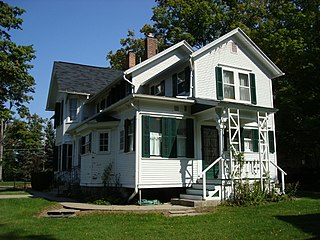
The Mann House is a historic home located at 205 Hanover Street in Concord, Michigan. It is a Michigan State Historic Site and is listed on the National Register of Historic Places. It has been operated as a museum since 1970.

The Norwayne Historic District, or Norwayne Subdivision, is an historic residential subdivision, originally built for World War II defense workers. It is located in Westland, Michigan and roughly bounded by Palmer Road on the north, Wildwood Road on the west, Merriman Road on the east, and Glenwood Road and the Wayne County Lower Rouge Parkway on the south. It was listed on the National Register of Historic Places in 2013.

The Isaac Cappon House was constructed as a private house, located at 228 West 9th Street in Holland, Michigan. It was listed on the National Register of Historic Places in 1984. It is now operated as the Cappon House Museum.
























